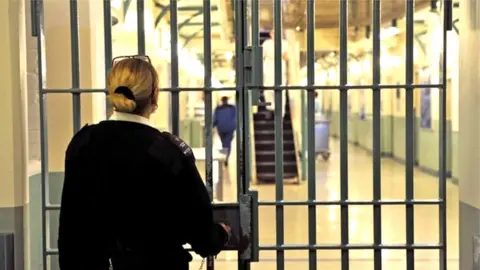No finding in nine out of 10 prison death FAIs
 BBC
BBCA study of almost 200 fatal accident inquiries into deaths in custody found the sheriff made no recommendation to improve practice in 90% of cases.
Academics at Glasgow University looked at 196 deaths in prisons covering almost 15 years from 2005 to 2019.
The authors said FAIs often took three or four years to complete but in most cases found no action that would have led to a different outcome.
The Scottish government said mental health was a priority for prisons.
Fatal accident inquiries (FAI) are official hearings into the circumstances of unexpected deaths. They are usually held in Sheriff courts and are aimed at preventing future deaths.
The study found the average time between the death of a person in custody and the publication of the FAI determination was 509 days between 2005 and 2008.
However, since legislation in 2016 aimed at making the process more efficient and fairer, the time has increased to almost 700 days.
There was also less chance of the FAI concluding with a finding about the circumstances of the death, the report said.
The team behind the report said the sheriff had the power to make findings on whether there were any defects in any system that resulted in the death and on whether any reasonable precautions could have prevented it.
In nine out 10 cases, however, there was no finding of a reasonable precaution and no recommendations to improve practice or prevent death.

 Allan family
Allan familyLinda Allan's daughter Katie died in Polmont Young Offenders Institute in 2018 and there has not yet been an FAI into her death.
Katie took her own life after being sentenced for drink-driving and knocking a 15-year-old boy unconscious.
Linda Allan said she had assumed her daughter was safe in state care and was horrified to discover that was not the case.
She said she was "flabbergasted" to discover the number of "preventable" deaths in custody, especially among young people.
Ms Allan started researching the details of the FAIs into deaths in custody to try to understand what happened to her daughter.
She told the BBC she wanted to "see if we could prevent this happening to anybody else".
Ms Allan said she did not really understand what the point of the FAI was if it was not to prevent future deaths.
"The FAI system in Scotland is broken and needs a complete overhaul," she said.
"Lots of these young people are in for minor offences but really it is irrelevant why they are in prison. People should not die for the crime they have committed," she said.
The initial work she and her husband did has been taken on by Glasgow University academics.

The report said that families were rarely involved in FAIs in terms of being legally represented, present at inquiries or providing evidence.
It also highlighted concerns about the provision of healthcare in prisons.
In one example a man complaining of pain and claiming to have a recurrence of previous meningitis, died of the condition while staff initially ignored him, then treated him with the drug used for overdoses, and shackled him after he had lapsed into a coma.
The report authors also question the value of the current FAI system in Scotland.
Sarah Armstrong, professor of criminology at Glasgow University, said: "If you were to design a system to maximise the suffering of families who have lost someone to death in prison, a system that would resist any change and is lacking in public access and transparency because most of the evidence is decided before it even gets to court, it is hard to imagine something more suited to those purposes than what we have right now."
In November 2019 the former Justice Secretary announced an independent review into deaths in custody. It is being led by Wendy Sinclair-Gieben, HM chief inspector of prisons for Scotland, and is expected to report back next month.
A Scottish government spokesperson said: "Every death in custody is a tragedy. The safe treatment and mental health of all those in custody is a key priority for Scotland's prisons, which care for people with higher levels of risk and vulnerability than the general population as a whole.
"We are determined any lessons that need to be learned will be learned, and that all appropriate agencies must look closely at the outcome of Fatal Accident Inquiries."
Scottish Conservative justice spokesman Jamie Greene said: "The SNP have created a broken system that moves at a snail's pace and makes absolutely no effort to correct itself.
"It is wrong to leave families in the dark like this. The Scottish Conservatives would introduce a legal time limit so that investigations are carried out promptly and ensure that lessons are learnt whenever an FAI concludes."